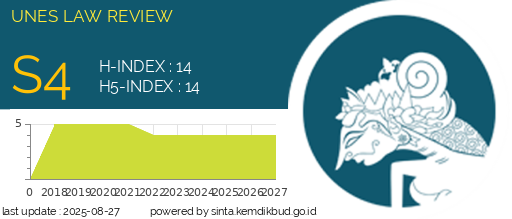Pembatalan Pailit Yayasan Rumah Sakit Sandi Karsa (Studi Kasus Putusan Mahkamah Agung Nomor 1262 K/Pdt.Sus-Pailit/2022)
DOI:
https://doi.org/10.31933/unesrev.v6i2.1396Keywords:
Postponement of Debt Payment Obligations, Bankruptcy, Debtor, Creditor, Good Faith, Principle of EquilibriumAbstract
Decision Number 1262 K/Pdt.Sus-Bankruptcy/2022 has sparked a discourse on the appropriateness of the Judges' Panel granting specificity to the Sandi Karsa Hospital Foundation to annul its bankruptcy declaration, as it operates in the management of hospitals. In essence, bankruptcy laws and PKPU (Penyelesaian Kepailitan dan PKPU) apply universally to all debtors, regardless of their business entity status operating in specific fields. The legal considerations of the judge state that creditors, in reality, intended to declare the debtor bankrupt without taking into account the debtor's proposed peace plan. This consideration becomes an interesting issue, as the acceptance or rejection of a debtor's proposed peace plan is the right of the creditor. The researcher will address the legal issues surrounding Decision Number 1262 K/Pdt.Sus-Bankruptcy/2022 using a normative juridical method. The author seeks answers to these legal issues based on norms, legal perspectives, or legislation. This legislative approach is employed by the researcher to examine legal regulations and other legal provisions related to insurance to address the issue. The application of specific bankruptcy conditions to the Sandi Karsa Hospital Foundation, as reviewed in Supreme Court Decision Number 1262 K/Pdt.Sus-Bankruptcy/2022, is deemed imprecise because the bankruptcy conditions under the Bankruptcy Law and PKPU apply generally and do not provide specificity to individuals or corporations, including legal entities and non-legal entities in liquidation. The voting rights of creditors during the discussion of a proposed peace plan are utilized with consideration for the principle of business continuity for the debtor. These voting rights are a realization of rational considerations and reflect the creditors' intentions toward the peace plan proposed by the debtor.
Downloads
References
Lumiere Rejeki Agustinus Pandiangan, Nyulistiowati Suryanti, Ema Rahmawati, “Analisis Putusan Mahkamah Konstitusi Nomor 23/PUU-XIX/2021 tentang Memperbolehkan Upaya Hukum Kasasi terhadap PKPU, Jurnal Ilmiah Multidisiplin, Vol. 1, No. 12, Maret 2023.
Regina Nitami Kasdi, “Analisis Putusan Pengadilan Niaga terkait Akibat Hukum Permohonan PKPU yang Diajukan oleh Pihak yang Tidak Berwenang (Studi Kasus Putusan Pengadilan Niaga pada Pengadilan Negeri Jakarta Pusat Nomor 24/Pdt.Sus-PKPU/2018/PN.Niaga.Jkt.Pst.”, Jurnal Hukum Adigama, Vol. 2, No. 2, Desember 2019.
Antonius Sidik Maryono, Ulil Afwa dan Sindy Riani Putri Nurhasanah, “Quo Vadis Esensi Lembaga PKPU Pasca-Putusan Mahkamah Konstitusi Nomor 23/PUU-XIX/2021”, Rewang Rencang: Jurnal Hukum Lex Generalis, Vol. 3, No. 4, 2022, hal. 2, diakses 5 Agustus 2023.
Pusat Analisis dan Evaluasi Hukum Nasional Badan Pembinaan Hukum Nasional Kementerian Hukum dan HAM RI Tahun 2018, Laporan Akhir Kelompok Kerja Analisis dan Evaluasi Hukum Terkait Kepailitan, hlm. 79, diakses dari https://bphn.go.id/data/documents/pokja_kepailitan.pdf,
Zainal Asikin, Hukum Kepailitan, ed. 1, (Yogyakarta: Andi, 2020)
Susanti Adi Nugroho, Hukum Kepailitan di Indonesia: Dalam Teori dan Praktik Serta Penerapan Hukumnya (Jakarta: Kencana, 2018)
Maria Farida, Ilmu Perundang-undangan, Yogyarakata, Kanisius, 2007.
Yuliandri, Asas-Asas Pembentukan Peraturan Perundang-undangan yang Baik, Rajawali Pers, Jakarta, 2010.
Downloads
Published
How to Cite
Issue
Section
License
Hak cipta :
Penulis yang mempublikasikan manuskripnya di jurnal ini menyetujui ketentuan berikut:
- Hak cipta pada setiap artikel adalah milik penulis.
- Penulis mengakui bahwa UNES Law Review berhak menjadi yang pertama menerbitkan dengan lisensi Creative Commons Attribution 4.0 International (Attribution 4.0 International CC BY 4.0) .
- Penulis dapat mengirimkan artikel secara terpisah, mengatur distribusi non-eksklusif manuskrip yang telah diterbitkan dalam jurnal ini ke versi lain (misalnya, dikirim ke repositori institusi penulis, publikasi ke dalam buku, dll.), dengan mengakui bahwa manuskrip telah diterbitkan pertama kali di Jurnal UNES Law Review.



















